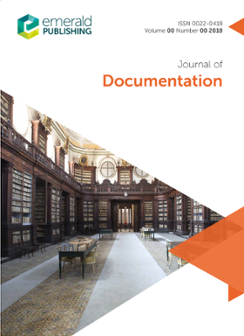Table of contents
Distributed records in the Rohingya refugee diaspora: Arweave and the R-Archive
Saqib Sheikh, Anne J. Gilliland, Philipp Kothe, James LowryThis article delineates the pilot implementation of the Rohingya Archive (R-Archive). The R-Archive seeks to both confront and exploit the roles of documentation and recordkeeping…
Can you feel it? The information behaviour of creative DJs
Keith Munro, Ian Ruthven, Perla InnocentiThis paper investigates the information behaviour of creative DJs, a group previously not considered from the perspective of information studies. The practice of DJing is a…
Documents as weapons: secret police files in Communist and post-Communist Romania
Iulian VamanuThis study examined dossiers of informative pursual (DIPs), a particular type of secret police files, before and after the fall of Communism in Romania. These DIPs were often…
The role of data sharing in survey dropout: a study among scientists as respondents
Urs Alexander Fichtner, Lukas Maximilian Horstmeier, Boris Alexander Brühmann, Manuel Watter, Harald Binder, Jochen KnausOne of the currently debated changes in scientific practice is the implementation of data sharing requirements for peer-reviewed publication to increase transparency and…
Designated Community: uncertainty and risk
Rebecca D. Frank, Laura RothfritzThis article explores the tension between the concept of a Designated Community (DC) as a foundational element in Trustworthy Digital Repository (TDR) certification and curators'…
Becoming a competent weaver: information literacy practice of the weavers of the Bonwire Kente Centre in Ghana
Franklin Gyamfi Agyemang, Nicoline Wessels, Madely Du PreezThis study examines what constitutes competence and how a novice becoming a competent weaver is enabled by information literacy in the fabric-weavers’ workplace landscape.
Contemporary spiritual seeking: understanding information interactions in contemplation and spirituality
Pranay Nangia, Ian RuthvenDiscussions in contemporary spirituality frequently highlight a phenomenon of spiritual seeking; moreover, people often describe their spiritual journeys in terms of a search…
Gigging it in the shire: information practices of Renaissance faire performers and artisans
Vikki C. TerrileThe purpose of this study was to explore the information behaviors (IBs) of performers and artisan/vendors in American Renaissance faires. This research is exploratory in nature…
Expanding the current tacit/explicit knowledge dichotomy encompassing situated and theoretical/normative knowledge: a phenomenological perspective
Sergio Evangelista Silva, André Luís SilvaThis article introduces a model of knowledge creation in consciousness, the creation of explicit knowledge in six forms and its register and organisation in documents.
Taking Chatman back to prison: rethinking the theory of life in the round
Jane GarnerThis paper serves to test the validity of Chatman’s theory of “Life Lived in the Round” within a modern prison context. In particular, it examines Propositions Five and Six of her…
The use of notebooks by Bangladeshi rural women to preserve information
Viviane Frings-HessamiThis article uses continuum theory to analyse how Bangladeshi rural women who participated in an information and communication technology for development (ICT4D) project accessed…
On thresholds: signs, symbols and significance
Betsy Van der Veer MartensThis paper reviews research developments in semiosis (sign activity) as theorized by Peirce, Eco and Sebeok, focusing specifically on the current study of “semiotic threshold…
Broadening the field of information
Boris BosancicThe paper discusses the notion of information with regard to its carriers, representatives (or structural carriers) and carried-related processes of transmission, accumulation and…

ISSN:
0022-0418Online date, start – end:
1945Copyright Holder:
Emerald Publishing LimitedOpen Access:
hybridEditor:
- Prof David Bawden